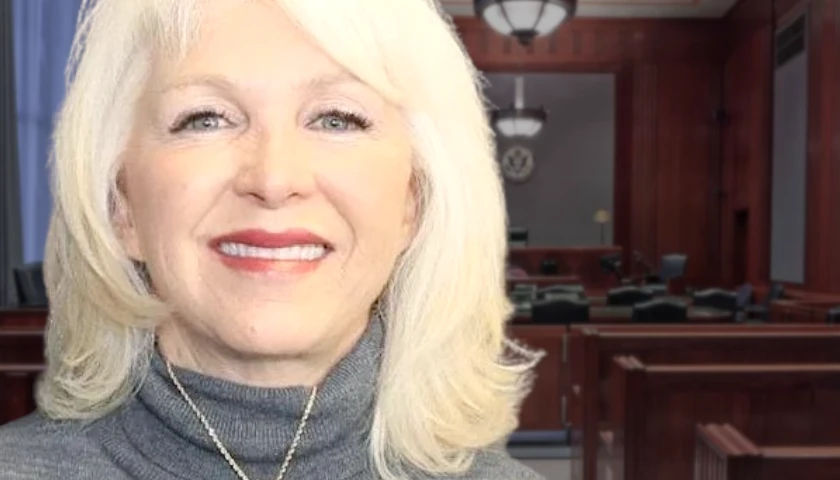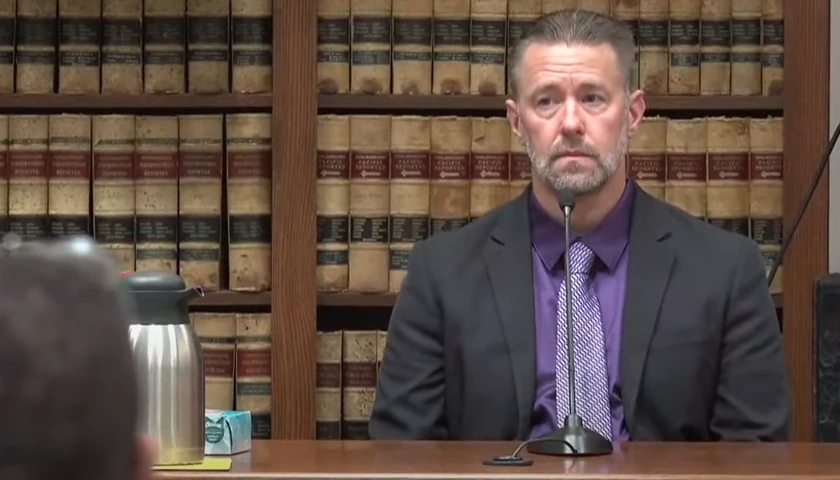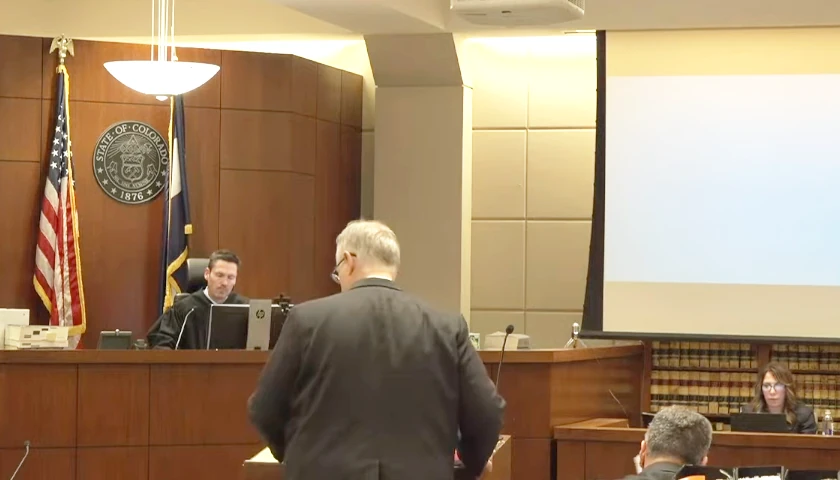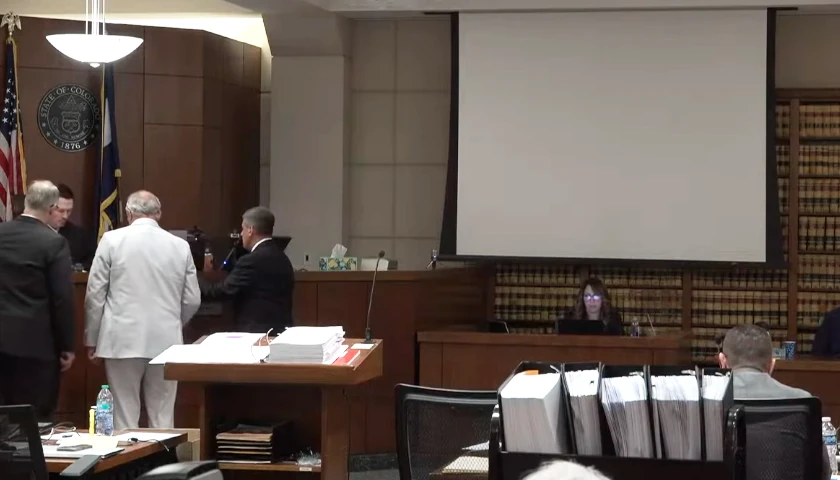The trial against former Mesa County Clerk Tina Peters over her efforts combating election fraud began this past week where two witnesses for the prosecution testified all day made disparaging remarks about The Gateway Pundit, a conservative news site.
The prosecution’s first witness, James Cannon, who identified himself as the chief investigator for the Mesa County District Attorney, said The Pundit was “a conspiracy site.” The prosecution’s second witness, Jesse Romero, who described himself as the voting systems manager for the Colorado Secretary of State’s (COSOS) Elections Division, said the news site posted an article with a “bombastic title.”
Peters is being prosecuted by the Colorado Attorney General’s Office on several charges, including felonies, related to alleged election tampering, official misconduct, and attempting to influence public servants in 2021. She is accused of allowing an unauthorized third party to make copies of voting machine hard drives, which led to “confidential digital images” of Dominion Voting Systems property and passwords to be “published on the internet,” prosecutors asserted.
Peters asked a consultant in 2021 to make a copy of the voting machine database when she found out that the COSOS would install a software update known as the “Trusted Build,” which a Dominion employee told her would wipe out files from the 2020 election. Both federal and state laws require the keeping of all election files for at least two years.
The trial on Thursday focused on the leak of the passwords, which allowed access to the bios of computer systems at her office. Testimony brought out that the passwords were likely obtained during the installation of the Trusted Build, which was observed by an outside consultant hired by Peters. However, it was also revealed that the Trusted Build created new passwords to override the leaked ones.
District Court Judge Michael Barrett, who was appointed by Democratic Colorado Governor Jared Polis, spent much of Thursday sustaining the prosecution’s objections against Peters’ attorney, Dan Hartman, and expressing his opinion on why he agreed with prosecutor Robert Shapiro.
Barrett appeared to be irritated as the trial began, ruling against Peters’ team on various issues and repeatedly cutting Hartman off when he attempted to dispute his decisions.

When Cannon was asked about The Pundit, which posted a video of the Trusted Build installation containing the leaked passwords, he responded, ” [It] is a conspiracy website that posts media, videos, claims, stuff like that.”
The prosecution played an interview Cannon recorded in which he questioned Peters. In it, Cannon divulged the leak of the passwords on the internet and told Peters that someone could use the passwords to change the bios passwords on her computers and lock her out of them.
Peters responded in the interview, “No, they can’t. They can’t access my machines. So they cannot, unless they can access them remotely. Are you saying they can access them remotely? No, okay, so they cannot access my machines unless they’re physically there and they have both passwords. So they would have to have our county passwords, and then they would have to have the Secretary of State passwords, just having one or the other to do anything.”
Election officials repeatedly claim that voting systems are not connected to the internet.
Hartman asked Cannon about the prosecution’s admission that making a video of the Trusted Build installation wasn’t a crime. Shapiro objected and said it wasn’t relevant. The judge agreed, said it wasn’t relevant to the jury, and wouldn’t let him continue his questioning.
Cannon said Peters’s providing access to the election data to Conan Hayes, who appeared to be an outside tech consultant, was a crime, but he did not know for sure what crime it was. He speculated that it could be a “violation of duty,” “conspiracy,” or “accessory.”
Hartman asked Cannon whether Peters knew that making a video of the Trusted Build installation would result in it being posted on the internet. Shapiro objected to the question, and the judge sustained it, claiming it wasn’t relevant since making the video wasn’t a crime.
Hartman next asked Cannon, “Talk about the passwords. That’s concerning, concerning to the jury. It’s concerning to me. Were the passwords functional at the time they were on the video?”
Shapiro interrupted him, “Objection, relevance, continuing. Objection.”
The judge sustained the objection and asked Hartman to lay the foundation to explain the relevance. Hartman said that when COSOS installed the Trusted Build, all the passwords were changed.
Shapiro kept objecting, and Hartman finally gave up that line of questioning.
Hartman attempted a slightly different line of questioning, “Do you know if any of those passwords would have opened a computer system in Mesa County?” he asked Cannon. Then he asked him if those passwords were used to conduct the Trusted Build installation.
Shapiro objected, and the judge sustained it, stating that it wasn’t a crime Peters was charged with, so it wasn’t relevant to any issue that the jury will determine.
Hartman asked Cannon about a tech consultant named Gerald Wood who was allowed key card access by Peters to perform the backup. He asked Cannon if it was a crime to use someone else’s key card to enter the building. Cannon said it depends on the circumstances; he would not answer yes or no. He said it was against policy to use another key card, but only in some circumstances could it be a crime, depending on the specifics.
Shapiro objected to the “ask and answer” approach as irrelevant, but the judge said, “The point has been made,” and sustained the objection.
Romero testified during the second half of the day. He said Trusted Builds are installed on almost all county elections systems in Colorado. Of Colorado’s 64 counties, 62 use Dominion’s system. He said the Trusted Builds are installed every two years during odd years, plus additional installs if there are system issues or new equipment.
He did not explain how this doesn’t violate the law. Federal law requires preserving election records for 22 months after an election, and Colorado state law requires preservation for 25 months. Violation of the federal law is a crime.
Shapiro asked Romero if there are paper ballots retained for 25 months after the election as required by law. He asked, “So if the computers crashed or were stolen or burned up in a fire, and if the records, the hard copies are held somewhere off site. Would you still have the ability to go through all the ballots for a particular election?”
Romero responded in the affirmative but did not address the fact that, unlike paper ballots, election files are not retained for 25 months after elections. No one has ever fully examined Mesa County’s paper ballots from the 2020 election.
Federal law requires retaining electronic data from voting machine tabulators, not just paper ballots. The Department of Justice’s Federal Prosecution of Election Offenses, Eighth Edition 2017, states that “[t]he detection, investigation, and proof of election crimes – and in many instances Voting Rights Act violations – often depend[s] on documentation generated during the voter registration, voting, tabulation, and election certification processes.”
When asked about The Pundit, Romero described the article there containing the leaked passwords as having a “bombastic title” about a “Dominion whistleblower” video.
Regarding leaking the BIOS passwords to the internet, Hartman asked Romero if anyone actually got into the BIOS of the computers and changed things. Romero admitted, “I don’t know if that was determined that the BIOS has changed.” However, he said he was investigating a “computer crime.”
Hartman asked him if he was aware that C.R.S. 1-5-607 states that elected officials may not access voting systems. He attempted to show that Peters did not access the systems.
Romero admitted he was familiar with the Colorado Revised Statutes covering that section of laws on certification since he was responsible for certification of the systems, but he said he wasn’t familiar with that statute.
The judge ordered legal counsel to approach the bench, where he apparently rebuked him.
Hartman asked Romero about an email he sent instructing Peters’ office that they could only have four people observe the Trusted Build installation due to a new COVID-19 policy. Hartman pointed out that it wasn’t a law or a rule, and Romero admitted that it was just “policy.” Previously, he’d also referred to it as “guidance,” Hartman said.
Last week’s trial concluded with Romero mentioning that a couple of other counties also wanted to make backups of their voting databases, but the judge cut him off without explanation and prevented him from providing further details.
Halfway through the day, the judge cut the livestream briefly to have a talk with one of the jurors and one of the attorneys. No details were revealed afterward.
The judge did not allow jury selection or the preliminary proceedings before the trial began to be live-streamed for the public.
WesternSlopeNow is live-streaming the trial, and the schedule is posted on Peters’ website. The trial is expected to finish on August 12.
– – –
Rachel Alexander is a reporter at The Arizona Sun Times and The Star News Network. Follow Rachel on Twitter / X. Email tips to [email protected].






